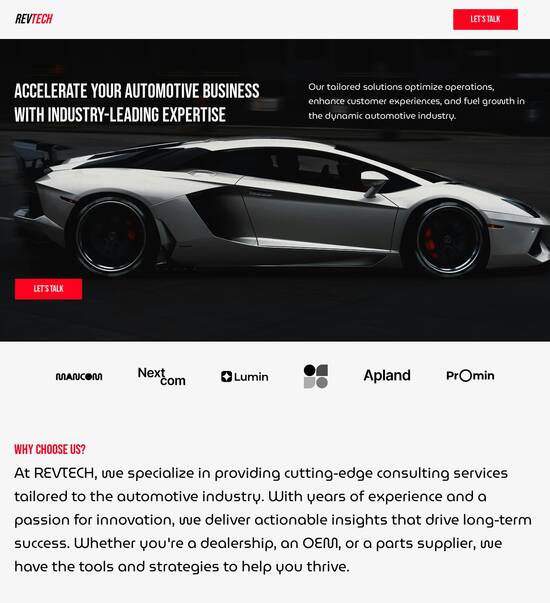
Whitepapers page template optimized for Lenovo tablet
Explore Similar TemplatesAbout template
Design using a responsive whitepapers page template that delivers a flawless experience on Lenovo tablet. Try Instapage today!
Recommended templates

Easy to build without coding
With the intuitive drag-and-drop builder, anyone on your team can create high-converting pages without any knowledge of code or design. Make enhancements to your landing page with custom widgets using Javascript, HTML/CSS, or third-party scripts.

Multiple layouts for any industry and goal
Select from 500+ landing page layouts built to boost conversions across industry-specific scenarios. Customize them by adjusting fonts, adding images, and generating on-brand content with the AI assistant. Quickly scale with Instablocks® and Global Blocks that you can save, reuse, and update globally.

Loads fast and looks polished on any device
Every template is responsive, which means they present professionally on any device and load blazingly fast with our Thor Render Engine. You can also power them up with Google AMP technology to deliver an unparalleled mobile experience and drive higher conversions.

Robust analytics & experimentation
Get real-time updates and reporting across all your devices, showing the number of visitors, conversions, cost-per-visitor, and cost-per-lead. Launch AI-powered experiments, run A/B tests, and use heatmaps to analyze user behavior, then optimize your landing page to maximize conversions.







Easy to build without coding
With the intuitive drag-and-drop builder, anyone on your team can create high-converting pages without any knowledge of code or design. Make enhancements to your landing page with custom widgets using Javascript, HTML/CSS, or third-party scripts.
Multiple layouts for any industry and goal
Select from 500+ landing page layouts built to boost conversions across industry-specific scenarios. Customize them by adjusting fonts, adding images, and generating on-brand content with the AI assistant. Quickly scale with Instablocks® and Global Blocks that you can save, reuse, and update globally.
Loads fast and looks polished on any device
Every template is responsive, which means they present professionally on any device and load blazingly fast with our Thor Render Engine.
Robust analytics & experimentation
Get real-time updates and reporting across all your devices, showing the number of visitors, conversions, cost-per-visitor, and cost-per-lead. Launch AI-powered experiments, run A/B tests, and use heatmaps to analyze user behavior, then optimize your landing page to maximize conversions.
All the features you need to build lead-generating landing pages
Explore more featuresLearn how to build top-performing landing pages for any goal
FAQs
Leading the way in building high-performing landing pages





A comprehensive guide to optimizing your landing pages with Instapage
Creating an effective landing page is crucial for maximizing your return on investment in digital marketing. Instapage offers a powerful platform that streamlines the process of building landing pages, enabling marketers across industries—from business services to tech and education—to effectively capture leads and optimize their campaigns. This guide will walk you through the essential steps to utilize Instapage for effective landing page optimization.
Understanding the features of Instapage
Instapage integrates various tools and features designed to enhance your landing page's performance. Each element—from templates to A/B testing—works synergistically to boost your marketing efforts. Here are some key features:
- High-converting templates
- Access over 100 professionally designed templates tailored for conversion, allowing you to focus more on engagement instead of design.
- Optimization tools
- Experimentation features, including detailed heatmaps and A/B testing, enable you to assess which variations of your landing pages perform best.
- Personalization capabilities
- Deliver personalized experiences using dynamic text replacement and tailored messaging for specific audiences.
Step 1: Choose the right template for your needs
Navigating the template options within Instapage is straightforward. Start by identifying the goal of your landing page—whether it’s to generate leads, drive sales, or promote an event—and select a template that aligns with that goal. Consider the following aspects:
- Purpose of the landing page
- Select a template specifically designed for your primary purpose to ensure clarity and focus.
- Audience engagement features
- Templates that offer lead generation elements like forms can significantly increase conversions.
- Mobile responsiveness
- Ensure the template you choose is optimized for various devices, especially mobile, as a large portion of traffic comes from mobile users.
Step 2: Customize your landing page
Once you've chosen a template, Instapage allows you to easily customize it using its intuitive editor. Focus on these critical elements:
- Headlines
- Craft engaging headlines that immediately capture attention and convey the page's value.
- Call-to-action buttons
- Design distinct buttons that lead users to take the desired action, ensuring they stand out on the page.
- Visual content
- Incorporate high-quality images or videos that enhance your message and engage with your audience.
By customizing your landing pages effectively, you're setting the stage for enhanced engagement and conversion rates.
In conclusion, optimizing your landing pages with Instapage not only improves user experiences but also drives better marketing results. Utilize the features provided by Instapage to create pages that resonate with your target audience.
Ready to take your landing pages to the next level? Get started with Instapage today and transform your marketing campaigns!
People also ask about Whitepapers page template optimized for Lenovo tablet
Unveiling the whitepapers page template for Lenovo tablets: A comprehensive exploration
Understanding the essence of whitepapers in digital contexts
Whitepapers are authoritative documents designed to inform and guide readers on complex topics. They play a crucial role in leveraging detailed research or technical data to convey information clearly. In today’s digital landscape, the way this information is presented has transformed dramatically, particularly with the rise of mobile devices like Lenovo tablets. Optimizing whitepapers for these devices ensures that the wealth of knowledge they contain is accessible to a broader audience.
Unlike traditional paper formats, digital whitepapers offer significant advantages in terms of accessibility and interactivity. Readers can easily navigate through sections, interact with embedded multimedia content, and even engage with polls or quizzes, which enhances their understanding. Therefore, as organizations adapt to the digital age, having a well-structured whitepapers page template tailored to Lenovo tablets can substantially improve user engagement and satisfaction.
Key features of the whitepapers page template
Creating a successful whitepapers page template involves several key features that ensure functionality and user experience. Below are some essential characteristics:
Responsive design for Lenovo tablets, ensuring that the layout adjusts to different screen sizes without losing quality.
User-friendly web interface that simplifies the process for administrators when managing and updating content.
Seamless server synchronization that allows quick content delivery and updates to improve user satisfaction over time.
Resource management solutions that optimize storage and retrieval processes for whitepapers.
Responsive design for Lenovo tablets
Responsive design is a cornerstone of modern web development and is particularly crucial for mobile devices like Lenovo tablets. A well-optimized responsive design ensures that users have an enjoyable experience regardless of device size. This is achieved through a fluid grid layout that automatically adjusts to fit different resolutions and screen dimensions.
For Lenovo tablets, specific adjustments are made for touch inputs. Larger buttons, optimal font sizes, and well-spaced links can greatly enhance usability, allowing users to easily navigate between sections without frustration. This intuitive layout contributes significantly to user retention and satisfaction, encouraging readers to explore more whitepapers.
User-friendly web interface
The user interface (UI) plays a vital role in the engagement levels of a whitepapers page. A distinct, intuitive design helps administrators effectively manage and modify content with ease. Features like drag-and-drop functionality for document uploads, simple editing tools for updating text and graphics, and seamless categorization enhance the overall experience.
Moreover, a user-friendly interface allows administrators to engage with analytics tools directly from the dashboard. This integration makes it easy to monitor how individual whitepapers are performing and adjust strategies accordingly.
Seamless server synchronization
Efficient content delivery relies heavily on back-end server systems. A well-structured server synchronization process ensures that the latest whitepapers are always available for users. When documents are updated or added, these changes should occur without significant delays in the user experience.
Servers should also be equipped to handle various traffic loads, ensuring high availability during peak usage times. Implementing caching mechanisms can further enhance performance, delivering content more quickly and reducing downtime. Collectively, these elements contribute to a reliable and user-friendly whitepapers experience.
Resource management solutions
Efficient resource management is vital for the optimal storage and retrieval of whitepapers. By allocating sufficient resources, organizations can ensure that their digital assets are not only protected but also quickly accessible for users on Lenovo tablets and other devices. Integrating resource management systems that align with existing hardware infrastructure plays an essential role in enhancing functionality.
Such systems can help track the usage of storage space, ensuring that no costs are incurred without proper utilization. Advanced algorithms can even analyze traffic trends to recommend adjustments in resource allocation, ultimately leading to better performance of the whitepapers page template.
Optimizing the whitepapers for diverse endpoints
Users access whitepapers from various endpoints, including smartphones, tablets, and desktops. To maximize readability on Lenovo tablets specifically, implementation of customization options becomes paramount. This encompasses font adjustments, line spacing, and the overall layout so that users can comfortably read without strain.
Additionally, optimizing the loading speed of whitepapers on mobile platforms can make a significant difference in user experience. Utilizing optimized images, compressing files, and implementing lazy loading techniques can all contribute to reducing lag and ensuring that users remain engaged with the content.
Navigating the complexity of hardware integration
Integrating hardware requirements into a whitepapers page template is crucial for enhancing performance. Understanding firmware and system requirements allows for the creation of a stable platform that supports seamless functionality. Compliance with recent firmware updates can ensure that the template runs efficiently and bugs are minimized.
System configurations also play a pivotal role in determining how effectively a whitepapers template operates. Admins should leverage management software that tracks performance metrics and provides insights into potential issues. This becomes particularly important in maintaining an accurate hardware inventory, allowing organizations to adapt quickly to evolving needs.
Furthermore, the optimal setup of server environments is essential for improved uptime and content delivery. Applying best practices for organization—such as systematic retrieval processes of whitepapers—ensures that all elements work together harmoniously.
Ensuring high availability across platforms
Uptime is a critical factor in maintaining user engagement with digital whitepapers. Users expect immediate access to valuable information at any time. Therefore, organizations must deploy proactive server management strategies that mitigate the risk of downtime. This could involve redundant server setups or regular maintenance schedules to preemptively address potential issues.
Learning from past failures can guide how to maintain consistent delivery, ensuring a positive experience for users. Implementing real-time performance monitoring and alerts can swiftly address problems as they arise, thus keeping whitepapers readily accessible.
Interactive elements to enhance user engagement
Incorporating interactive elements within whitepapers can significantly increase user engagement. These features can range from clickable graphics that provide more information to embedded tools for quizzes and feedback forms. Using plugins that support these functionalities allows for a richer content experience tailored to diverse audience preferences.
Tracking engagement metrics through built-in analytics helps organizations understand how users interact with whitepapers. Gathering this data not only informs content strategies but also aids in refining which interactive elements are most effective. Continuous adaptation in response to these metrics ensures that whitepapers remain fresh and compelling.
Elevating accessibility and usability
Accessibility is an essential aspect of creating digital content that caters to diverse user needs. Implementing features such as text resizing, screen reader compatibility, and visually-friendly layouts can help ensure that whitepapers are inclusive for individuals with disabilities. These accommodations enable a broader audience to engage with the material effectively.
Moreover, simplifying navigation within the whitepapers page enhances usability. Clear pathways and intuitive categorization allow users to locate documents without confusion. This focus on user journeys greatly elevates the discoverability of relevant whitepapers, encouraging readers to delve deeper into the content.
Analyzing success: Metrics and feedback loops
The role of analytics in refining whitepapers and their available templates cannot be overstated. By monitoring key performance indicators (KPIs) related to user engagement, organizations can identify areas for improvement. Metrics may include the number of downloads, average time spent on a document, and user interactions with embedded elements.
Collecting user feedback is also essential for continuous improvement. Surveys, comment sections, and direct outreach can provide valuable insights into what readers appreciate and areas that need adjustment. Incorporating this feedback into future versions of whitepapers helps create content that directly addresses audience expectations and needs.
Future innovation: Evolving whitepapers for Lenovo tablets
The future of whitepapers is rapidly evolving alongside technological advancements. Predictions suggest a rise in incorporating multimedia elements, such as video and interactive infographics, into whitepapers, making them even more engaging. These advancements will require templates that adapt seamlessly to the growing diversity of content types.
Moreover, emerging technologies like artificial intelligence and machine learning will likely impact how whitepapers are created and distributed. Organizations will need to be proactive in adapting to these changes, ensuring that their whitepapers remain relevant and effective. By prioritizing continuous adaptation in response to user feedback and technological advancements, organizations can stay ahead of the curve in the competitive digital landscape.
Ready to skyrocket conversions?
Supercharge your ad campaigns with high-performing landing pages
Get started














